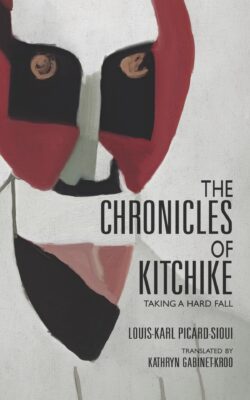Step into the make-believe community of Kitchike in Wendat writer Louis-Karl Picard-Sioui’s The Chronicles of Kitchike: Taking a Hard Fall. Translated from the original French by Kathryn Gabinet-Kroo, this collection of short stories juggles characters and genres to build a world where real issues meet the fantastical.
Picard-Sioui welcomes us to this world through a hangover. In “Prologue,” Pierre Wabush wakes up with a splitting headache and no clue where he is. This first protagonist describes Kitchike as a place that “has a way of perverting anything beautiful and good. For ripping your body open so that you muck about in your own guts.” It feels hopeless, but Wabush is definitely the most cynical of the author’s narrators.
The Chronicles of Kitchike Exile Editions
Taking a Hard Fall
Louis-Karl Picard-Sioui
Translated by Kathryn Gabinet-Kroo
$24.95
paper
152pp
978155096-9931
“Meanwhile, In the Neighbouring Town” serves as a vehicle for the author to respond to Indigenous stereotypes. White characters with absurd names like Mr. Eyes, Mr. McClass, and Dr. Dentures are standing around a butcher shop exchanging falsities about First Nations people being “freeloaders” and “savages.” This story was probably the weakest link for me. I love the idea of Kitchike existing next to a town of cartoon-like white buffoons, but the dialogue-heavy scene is very on-the-nose. It basically reads as a list of all the horrible things white people might believe about First Nations. Maybe that’s the point, but it clashes with the imaginative writing that defines the rest of the collection.
Stories like “The Cage” and “The Man Who Makes the Stars Dance” are written like urban folk tales. There’s a fire-spitting woman praying to the Lord of the Nomads for the power to leave Kitchike behind. There’s a musician who is visited by a character from a children’s book who wants to bring him to her universe. Tradition and modernity intertwine in “Omens” when Kitchike’s old shaman meets with a former Catholic missionary on the anniversary of a tragedy that isn’t initially described, but involves the disappearance of a woman who was close to both men. In these scenes, Picard-Sioui swaps irony for sentimentalism and dips a toe in the deep pool of mythic retelling.
All worlds collide in two stories: “Chez Alphonse” and “The Hard Fall.” The former is set at Alphonse’s Gas Bar, where all the characters meet and mingle; it could serve as the premise for a Canadian sitcom about different walks of life. The latter revolves around a corrupt band council chief trying to recruit the inhabitants of Kitchike to cover for him – a crime novel in the making. They’re more examples of Picard-Sioui playing with genre and tone, as if he’s figuring out how he wants to guide you through this reserve. Or maybe he’s just showing the different ways you can tell Indigenous stories.In Kitchike, anything can happen.
The Chronicles of Kitchike: Taking a Hard Fall is an uneven book, sometimes crass and silly, other times basking in black comedy and magic realism. Picard-Sioui has already written a French-language play and another collection of short stories set in Kitchike, a world that its author is evidently still building.mRb






0 Comments